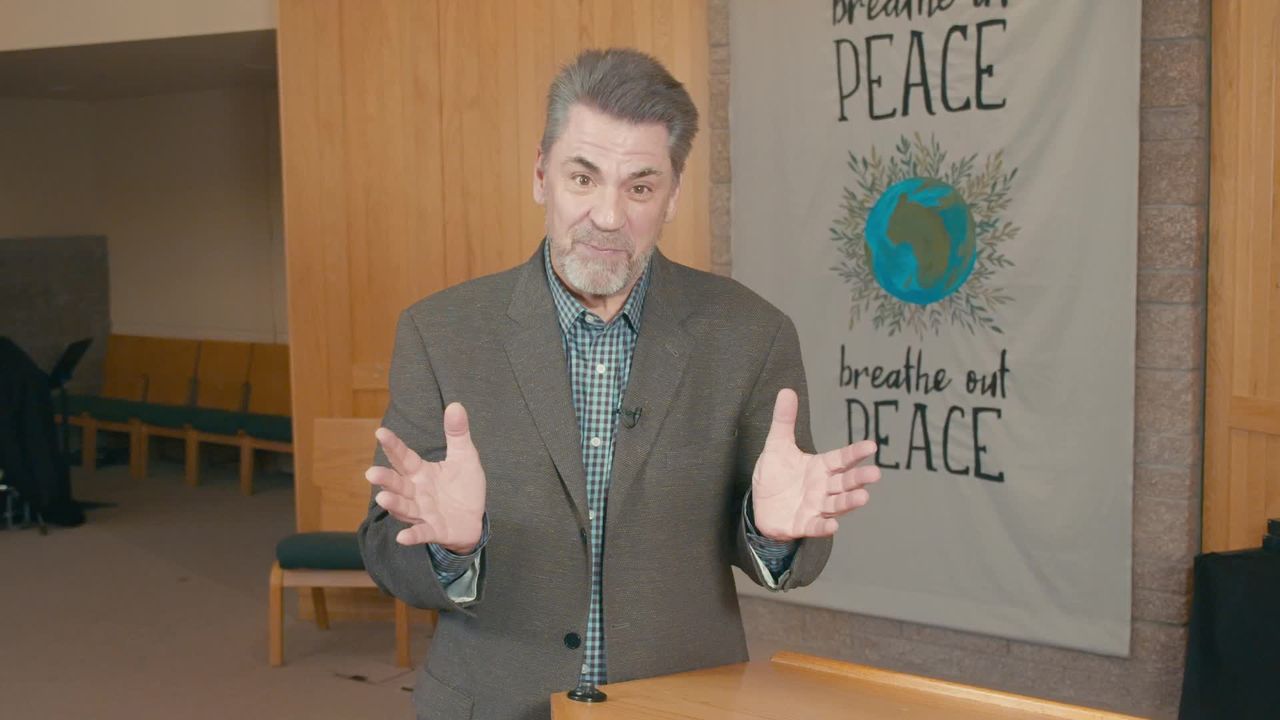Mar 3rd: Loving Your Enemies, with Rev. Dr. Steven Koski.
A Part of the Series:
Rev. Dr. Steven Koski
Other Articles in:
WATCH:
Loving Your Enemies with Rev. Dr. Steven Koski. Series: Everyday Peacemakers A Spacious Christianity, First Presbyterian Church of Bend, Oregon. Scripture: Matthew 5.9;Matthew 5. 43-48;John 13.34;Luke 19.5-6.
Transcript:
Steven: Madeline L’Engle wrote everything we are learning from astrophysics makes clear what people of faith have always known that us versus them is a violation of creation. Creation exists only in interdependence, and unity. We are already one, we imagine we’re not, and we have to recover our original unity. She said tribalism must be transformed into community. tribalism transformed into community, that holy task feels urgent, almost as if our very survival depends on it. Our theme for the season of Lent leading to Easter, is every day peacemakers. Jesus said, Blessed are the peacemakers, for they shall be called children of God. In a world divided by difference, discourse, disdain for the other. What kind of Peacemaker? Will you be? Here’s how Jesus describes everyday peacemaking in his famous sermon, called the Sermon on the Mount. He said, You’re familiar with the old written law, love your friends, and it’s unwritten companion, hate your enemy. I’m challenging that. I’m telling you, to love your enemies. Let them bring out the best in you. Not the worst. When someone gives you a hard time, respond with the subtle moves of prayer. For then you’re working out of your true self, your God created selves. This is what God does. God gives God’s best the sun to warm the rain to nourish to everyone. Regardless, the good and bad, the nice and nasty. If all you do is love the lovable, you expect a bonus. Anybody can do that. If you simply say hello to those who greet you. They expect a medal. Any run of the male center does that. In a word, what I’m saying is grow up your children of God now live like it. live out your God created identity, Live generously and graciously toward others, the way God lives toward you. Love your enemies, let them bring out the best in you. Not the worst. And that’s our spiritual work in these divisive times. For 2020, for the very worst of our humanity and an ugliness of spirit is on full display right now. Our challenge in the way that we engage the conflicts and divisions is not to be a reflection of the same spirit of ugliness we are protesting our spiritual challenge is to shine light into the darkness and not add to the darkness and how we engage our spiritual challenges everyday peacemakers is to not allow our enemy to become our inner me. Let me repeat that we must prevent our enemy from becoming our enemy. In other words, we don’t need to allow what what other people do to determine what we do and who we choose to be. I mean, the real test of our faith is not how much we love Jesus. But whether we are willing to love Judas, the real test of our faith is learning to love those we find most difficult to love. When it’s much easier to hate and judge and condemn. Learning to love those we find hardest to love. Just might be the closest closest we can get to a Jesus shape love. I mean picture Jesus. Picture Jesus, tenderly washing the feet of Judas knowing he would betray him. And then Jesus said A new commandment I give you Love one another. As I have loved you know the love Jesus is talking about isn’t isn’t a soft and fuzzy and sentimental love the word Jesus use translated as love is agape. Agape love is fierce. Agape love is best defined as a dog ID determination to care for the other, regardless of whether you like them or agree with them. Agape love is a dog a determination, to see me see the image of God and the other to see the humanity and dignity in the other. Even when it’s hidden, or difficult to see, when I was asked to give, give a talk as part of a leadership program on the topic of civility. And I suggested, civility is too low of a bar. I mean, there’s been a shift that’s taking place in our society, where we no longer have contempt for someone’s ideas that we disagree with. We now have contempt for the person holding those ideas. When we disagree, there is now a tendency, even an accepted practice to dehumanize and demonize those with whom we disagree. So just learning to be to be civil, to tolerate to be nice to one another, isn’t enough. Our goal should be to re humanize one another to recognize our shared humanity, to see the image of God in the other. I mean, Jesus didn’t say, you know, tolerate, be nice to your enemies. Jesus said, Love, agape love your enemies. And a god agape love is the determination to bless someone, when what you really want to do is punch them in the nose. It is not our differences that divide us. It is how we choose to engage those differences that divide us. You know, I don’t think the goal is necessarily to disagree less. I think the goal is to learn how to disagree without demonizing the other, or losing sight of our own humanity and goodness. Conflict is inevitable. Combat is always optional. We can learn a different way, we can learn a different way of engaging with one another in our differences, that brings out the best in us. And not the worst. mean, the only way that tribalism as any chance to be transformed into community is to engage those who are different. Those with whom we disagree, dislike, maybe even disdain. And try to build bridges where there’s hostility. I mean, it’s easy to hate judge and condemn from a distance. Hate fear judgment, can’t survive proximity. I mean, do we dare get close enough. Close enough to those we find hardest to love with a, with a dog a determination to listen and care. I love the story of Zacchaeus, the tax collector and Luke 19. Now the key is is the enemy of enemies. He’s a wealthy guy who’s become wealthy by selling out the Jews, who were mostly peasants, collecting taxes from them, to pay for the Roman army that is occupying their land. And Jesus is passing through town. The curious Zacchaeus was curious, but apparently he was short. So he had to climb a sycamore tree to see Jesus. And the Bible says when Jesus reached the spot, he looked up. And he said to kids, come on down. I want to stay at your house today. So the kids came down. And welcome Jesus gladly. Did you notice? Jesus seeks an invitation to his house. He doesn’t say it as a key as Hey, come on over here where my friends are and where we’re hanging out. Jesus says does a kiss. I actually want to come to where you hang out. I want to go to your house. I want to break bread with you so that I can learn about your life and your story. What would it look like? To seek an invitation to be in relationship with those with whom we disagree? Maybe dislike, perhaps even disdain. When we believe that we can’t even be in relationship with those with whom we disagree where do we go from there? Probably the most important people to try and love are those who don’t love us. And agape love. Jesus shaped love is intentional. intentional about engaging, the other intentional about trying to break down the walls that divide is intentional about being willing to step out of our comfort zones, and seeking proximity to listen to the stories of those, not like us intentional about seeking courageous conversations. I mean, Jesus said, If all you do is love the lovable, the expect a bonus. Anybody can do that. And Jesus also said, when someone gives you a hard time, pray for them. I want to suggest as a spiritual practice during the season of Lent that you commit to praying every day, for the one that you find the hardest to love. I mean, praying for our enemy doesn’t necessarily change our enemy. It can change us. It can soften our hard edges. It can invite humility, reminding us that, you know, we are all someone else’s enemy. I mean, pray for difficult people. Because I hate to tell you that you yourself, are a difficult person, to someone else. I confess there’s a person I find really, really difficult to love. And I really dislike who I am in response to this this person’s behavior. I confess this person brings out the worst in me, my enemy, becomes my enemy. So I started to pray for this person. Every morning, I light a candle, I spend time holding this person in the light of Christ’s love. I pray for this person’s highest good. Now I have no idea if my prayers are having any impact at all on the person I’m praying for. I’ll leave that to God. What I do know is this spiritual practice has changed me. I’ve noticed that that the hardness of my heart has softened, that my My judgment is turned to empathy. I see this person is deeply, deeply wounded. I can see that what I perceive as very hateful behavior and rhetoric is driven by so much fear and a deep woundedness. So this practice of prayer for my enemy has transformed me from a posture of judgment and even hate to one of love. Now, I still hold many of the ideas of this person with contempt. I no longer hold the person with contempt. Jesus said, Let your enemies bring out the best and not the worst in you. The real test of our faith is not not whether we love Jesus. But whether we’re willing to love like Jesus. So my challenge for you during this season of OLED is to to someone you disagree with someone perhaps you’re in conflict with someone who who brings out the worst and the ugliness the ugliest in you and dare to get close enough to listen and care to hear their story and find at least at least one way to bless them and pray for them. And my guess is that you will be the one who is blessed and may not change the world. But it will change you. You know the world that lives like a clenched fist an everyday Peacemaker moves toward those we find the hardest to love with an open head, eyes willing to see the image of God in them and an agape shaped heart ready to show the world Love is stronger than hate. May it be so


